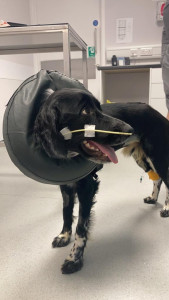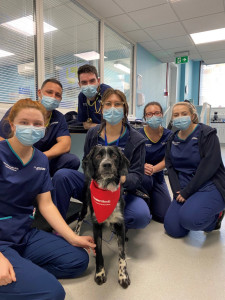Do you need help?

Dog saved by Glasgow vets using trailblazing treatment
A dog left on the brink of death by a rare blood disorder had his life saved – thanks to trailblazing hi-tech treatment rarely used before in Scotland.​
One-year-old Riley was struck down after his immune system mistakenly began destroying his healthy blood cells rather than protecting him from infection.
After he suddenly ​became lethargic, began shaking and his temperature soared, Riley’s local vets in Perth suspected he may be suffering from a highly aggressive form of anaemia.
They carried out several tests and a scan and referred him for further testing at the Royal (Dick) School of Veterinary Studies, Hospital for Small Animals, part of the University of Edinburgh.
Riley, a Springer Spaniel and Border Collie cross, was so ill that two separate vets had to be put on standby along the 55-mile route from his family’s home in Perth in case he suffered a seizure on the way.
After several days and multiple testing Hospital for Small Animals clinicians confirmed what Riley’s local vets feared: he was suffering from Immune Mediated Haemolytic Anaemia, a potentially fatal condition which leads to reduced oxygen supply to the brain and vital organs.
Riley spent eight days in intensive care – including his first birthday – as specialist staff carried out multiple blood transfusions to try to save his life.
Despite aggressive immune suppressive treatment and a total of nine blood transfusions his disease could not be controlled and Riley’s condition continued to worsen.
As a last chance to save his life, Hospital for Small Animals veterinary surgeons recommended to Riley’s owners that they consider a pioneering procedure called therapeutic plasma exchange.
The extremely complex process sees blood extracted and then piped through a purification machine before being pumped back in to a patient.
Initially it appeared the only place the treatment could be done was in London – and poor Riley was just too ill to undertake the 460-mile car journey.
By this point, Riley’s owners Lisa and Phil Gregory and their children Katie and Harry were losing all hope.
But then it emerged that the expert team at Vets Now’s 24-hour emergency hospital in Glasgow were able to offer to the plasma exchange much closer to home.

Lisa said: “We spoke with the Vets Now team on the phone and they were very honest with us, explaining that there were no guarantees whatsoever but they believed Riley had a chance of recovering if the plasma exchange was carried out.
“For Riley’s sake we decided we had to give it a try – we’ve had him since he was tiny, he instantly became part of our family and we just couldn’t imagine life without him, so we collected him from Edinburgh and drove him across to Glasgow.”
Riley was so weak by this stage that even something as straightforward as putting him under sedation was tricky – in case the injection caused severe bleeding.
But led by emergency and critical care specialist vet Neus Elias, the Vets Now team carefully set to work.
Neus said: “Therapeutic plasma exchange is a technique where a patient’s blood is processed to separate the components of the cells from the plasma so as to remove the harmful components.
“This technique has only been used twice before in Scotland for this disease, and once before for a different disease.
“Over the course of six hours, we slowly processed three pints of Riley’s blood.
“The watery portion of the blood was discarded, and Riley was then transfused with an equal volume of plasma products to replace this from healthy dog donors. The washed-out cells were then transfused back to him.”
And to the family’s amazement, just five days later Riley was trotting out of hospital on his own four paws and into the car to head home.
Lisa said: “Poor Riley had been so ill for so long that it seemed almost impossible to have him back to any kind of health – so to see him walking out on his lead was a really emotional moment.”
Now, after six months of constant medication to tackle his immune system and having to avoid other dogs because he was so at risk of severe infection Riley has made a full recovery.
He has just finished his final round of medication, though he’s still needing ongoing blood checks.
Lisa said: “Neus and the team at Vets Now were brilliant – they kept us informed at every stage and we’re just very grateful to them and also to the all the staff at Tay Valley Vets in Perth and at the Hospital for Small Animals.
“Riley’s had the most amazing care from everyone, and the Hospital for Small Animals even arranged a wee first birthday party for him to cheer him up. He’s really a very lucky dog – and he’s brave too.
“He was so well behaved and tolerant of all the procedures and in the end, he didn’t need sedating for the plasma exchange but did need a large cannula in his neck just in case of any issues.
“It is really frightening when your dog is diagnosed with something this rare and I got a lot of kindness and support from the IMHA dogs support group UK public group | Facebook which was really important not just to me but to the whole family as well. We’re very grateful to them too.
“And the amazing thing is: to look at Riley now, it’s as if nothing ever happened.
“He’s back to opening the treat cupboard with his nose … in fact, he’s looking up at us now because he knows I’m talking about him!”
Neus added: “We all remember Riley, he was such a lovable character and such a challenging case .. and we’re just so delighted he’s made such a great recovery. His case really does show that even in the bleakest of situations there can often be hope for your pet.”
